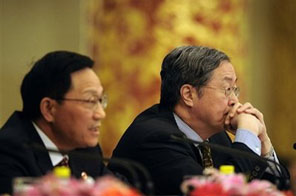China says it's up to the US to improve relations
BEIJING: China said Sunday that it is up to the United States to improve relations that soured over U.S. arms sales to Taiwan and a meeting between President Barack Obama and the Dalai Lama.
Beijing was incensed by Washington's January announcement of a $6.4 billion weapons package for Taiwan, the self-governing island it considers Chinese territory. Beijing suspended military exchanges and has threatened to retaliate against U.S. aerospace firms involved in the deal.
Beijing protested again when Obama met at the White House with the exiled Tibetan spiritual leader, the Dalai Lama, whom Beijing accuses of seeking independence for the Himalayan region.
"The responsibility for the difficulties in China-U.S relations does not lie with China," Foreign Minister Yang Jiechi told a news conference held on the sidelines of the annual meeting of the National People's Congress, China's legislature.
Yang said the arms sale and meeting had undermined China's interests. "The United States should take seriously China's position and respect China's core interests," he said.
He did not indicate if a recent visit by two high-level U.S. officials, Deputy Secretary of State James Steinberg and Senior White House Asia adviser Jeffrey Bader, had helped put relations back on track. The two sides also have differences over trade and how to deal with Iran's nuclear plans.
Yang said the two sides held "in-depth and candid discussions," but did not give details.
The dip in relations comes as Western powers seek to introduce a new set of sanctions against Iran if it continues to defy Security Council demands over its nuclear program. Yang repeated China's stance that it thinks a resolution to the issue will come through continued dialogue.
"We don't think diplomatic efforts have been exhausted," he said.
The proposed sanctions would target Iran's powerful Revolutionary Guard and toughen existing measures against its shipping, banking and insurance sectors, well-informed U.N. diplomats said Wednesday.
The U.S., Britain and France support such new sanctions, and Russia — which is normally opposed — appears to be moving closer to that view. That leaves only permanent Security Council member China — which depends on Iran for much of its energy needs — opposed to new sanctions.
Other irritants include Google's contention that its e-mail accounts were hacked from China, followed by U.S. Secretary of State Hillary Rodham Clinton's criticisms of the censorship of cyberspace by China and others. Beijing lashed out at Google and what it labeled U.S. "information imperialism," while the Foreign Ministry said Clinton's remarks damaged bilateral relations.
The new tensions join recurring friction over human rights and commerce, with U.S. critics accusing China of deliberately undervaluing its currency to boost its massive trade surplus. Meanwhile, Beijing has charged Washington with abusing trade relief measures after U.S. regulators increased import duties on Chinese-made steel pipes.






